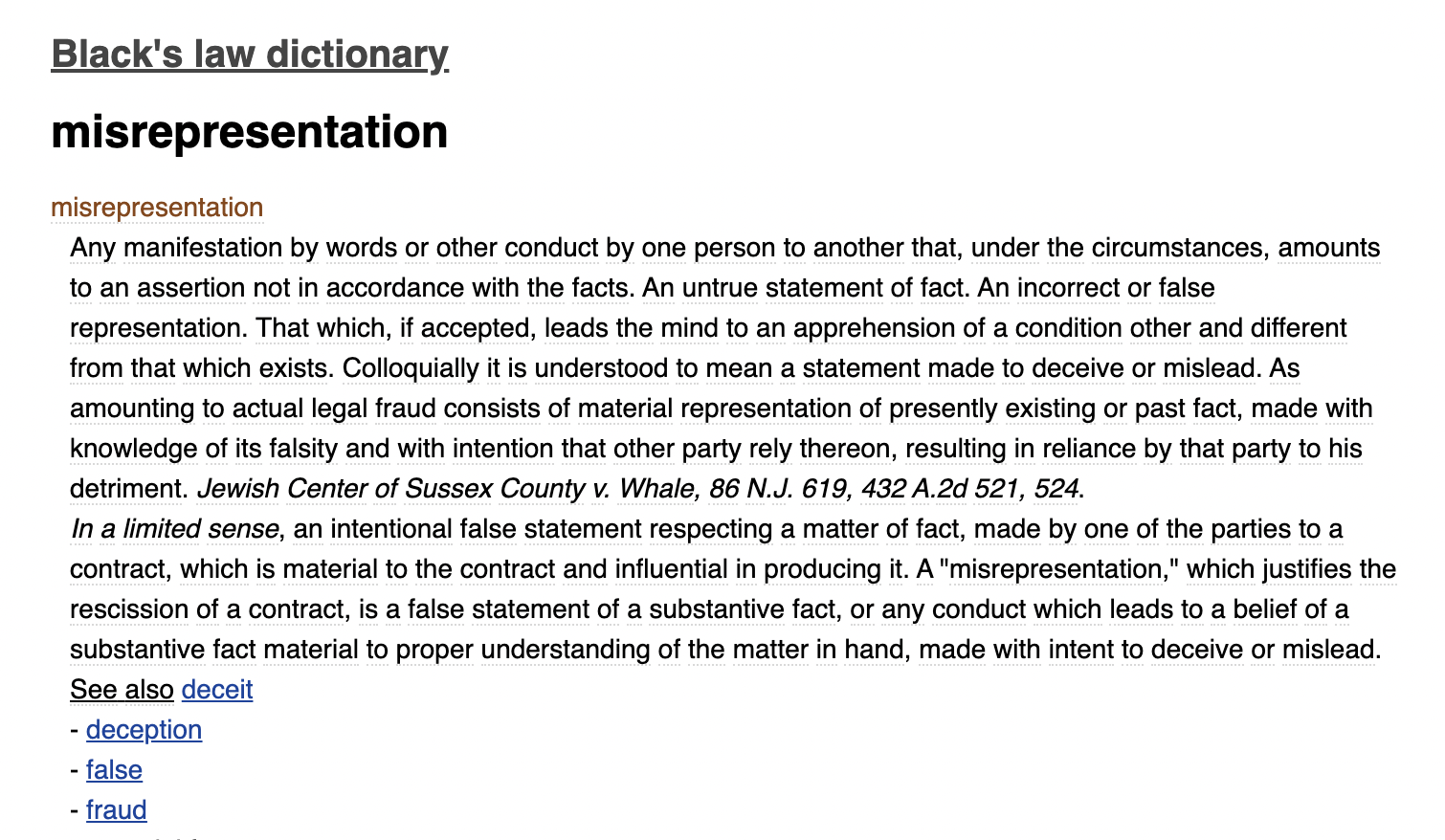Misrepresentation

— Get Black’s Law Dictionary on Amazon.
This large format softcover book is the first volume of the 1910 2nd Edition of Black’s Law Dictionary. This volume contains letters A-J.
This large format softcover book is the second volume the 1910 2nd Edition of Black’s Law Dictionary. This volume contains letters K-Z.
Start here with …
Misrepresentation
Is it Fraudulent, Negligent or Innocent Misrepresentation?
Listening Activity
Comprehension Questions
Writing Activity
Additional Links, Cases, & Resources
Vocabulary
Area of law: Commercial Law
Section 3 – Contract Misrepresentation
Listening task: Take notes.
Timing: This listening is 6 minutes and 20 seconds long.
Lawyer: Good afternoon, Miss Seymour. I believe you’ve had a problem regarding a business that you bought last year and you feel some legal advice may be called for.
Miss Seymour: Yes, that’s right. I’m a hairdresser and I’ve recently bought my own business. I’ve worked for various employers here in Chatsworth and last year I decided to take the plunge and buy a salon of my own. The trouble is, I bought it from a man called Paul McKenzie, who wasn’t exactly honest with me when he persuaded me to sign the contract of sale.
Lawyer: Paul McKenzie. I’ve heard of him actually. He’s quite well known in the area. Doesn’t he have 2 hairdressing salons in Chatsworth?
Miss Seymour: Well, he did used to have 2, yes. He’s got a salon called ‘McKenzie’s’ on Holloway Road and he had a smaller one called ‘Heaven’ on King Street. I bought the little one.
Lawyer: And in what way was he dishonest in the run up to the sale of the salon? Had he been cooking the books, do you think?
Miss Seymour: No, it’s not that. He told me before I bought the salon that the reason for selling it was that he planned to move abroad by the end of the year. That was in August 2011. He said he was setting up a new business in Majorca, in February 2012, and that he planned to sell both of his salons here in Chatsworth as soon as possible. He explained that he was selling the small one first but he needed to think carefully about finding the right buyer for the bigger one as it had so many loyal clients who expected a great service.
Lawyer: May I ask how much you paid for the small salon?
Miss Seymour: I paid £75,000. When I checked out the accounts the annual turnover looked good at £200,000 a year and the profit looked healthy as well. Paul McKenzie explained that the clientele is very loyal and that he expected the business to remain profitable as long as I continued to provide a good service.
Lawyer: I see. Please go on.
Miss Seymour: Well, I completely believed him when he said he was moving to Spain and that he’d sell the bigger salon on Holloway Road by the end of 2011. He even showed me photographs of his new salon and apartment in Majorca.
Lawyer: I see. And I’m guessing Mr McKenzie is still with us here in Chatsworth, almost a year after he was due to depart.
Miss Seymour: That’s right. He’s kept on the bigger salon and the majority of my customers just started making appointments there once they realized he was still in town. From looking at his accounts for the past 3 years I expected to make a profit of around £50,000 in my first year. I’ve actually made less than 5.
Lawyer: That’s very serious indeed. That’s nowhere near a living wage and you can’t continue like that. Have you approached Mr McKenzie about this?
Miss Seymour: Yes. His response is just to keep repeating the fact that I signed a binding contract to buy the salon and there is nothing in it that forces him to sell his other salon. He’s been really rude and unhelpful, which is why I’ve come to see if there’s anything I can do about it legally.
Lawyer: Well, in fact you can. I’ll need a few more details from you but I’d say we may well be able to take action against the seller on the grounds of misrepresentation.
Miss Seymour: But he says there’s nothing in the contract that forces him to sell his second salon. And I’ve looked through it and he’s right. He told me he was selling it and moving to Spain but that’s not mentioned in the contract and no one else even heard that conversation, as my sister was sitting outside in the car. I would never have bought it if I’d known he was going to stay at the bigger salon. It’s obvious that all of his clients would follow him there.
Lawyer: I agree. But the law does provide us with a remedy in situations like this. Allow me to explain. According to contract law, a representation is a statement that one party makes in order to persuade the other party to sign an agreement. In our case, the important representation was Mr McKenzie’s stated intention to sell the second salon before the end of the year. If that representation turns out to be false, the law terms it a ‘misrepresentation’ and you can, in some circumstances, ask a court to set aside the contract on that basis.
Miss Seymour: I don’t quite understand. Do you mean that because he was dishonest with me before I signed, we can cancel the contract?
Lawyer: That’s precisely what I mean. A court refers to the cancellation process as ‘rescinding‘ or ‘setting aside‘ the contract on the grounds of fraudulent misrepresentation. Mr McKenzie was untruthful but nevertheless, you relied upon his statement and you were persuaded to sign. I think we may well stand a good chance of getting you your money back. If that’s what you’d like, of course.
Miss Seymour: What, all of it? All £75,000? That would be brilliant. I could buy somewhere else if we could do that.
Lawyer: Yes, I do mean all of it. The purpose of rescinding a contract is to put both parties back in the position they were in before the contract was entered into. It’s quite a usual legal remedy in cases like this. There’ve been some quite high profile cases based on misrepresentation, or, as we lawyers usually refer to it, ‘misrep‘. You may remember the Spice Girls having to pay back some sponsorship money to an Italian scooter firm, Aprilia, on the grounds of misrepresentation. Their management weren’t completely open about various things in the course of negotiations with the Italians and it resulted in them having to pay back a significant amount of sponsorship money. £500,000 in total, if I remember correctly.
Miss Seymour: Yes, I remember that. It was in the news for weeks. Could we take the same action?
Lawyer: I believe we could, yes. The other alternative is for you to stay where you are and for us to claim damages. That would give you financial compensation for at least part of your loss, but there’s no guarantee that your business will do well as long as Mr McKenzie stays where he is. I strongly advise we ask the court for the remedy of rescinding the contract and return ownership of the salon to Mr McKenzie and of course, return the sale price to you.
Miss Seymour: That sounds fantastic. When can we start?
Texts on Misrepresentation
Ever need a fact or quotation on misrepresentation? Designed for speechwriters, journalists, writers, researchers, students, professors, teachers, historians, academics, scrapbookers, trivia buffs and word lovers, this is the largest book ever created for this single word. It represents a compilation from a variety of sources with a linguistic emphasis on anything relating to the term “misrepresentation,” including non-conventional usage and alternative meanings which capture ambiguities.
Comprehension Questions
Answer the following questions in your own words.
1
What is Miss Seymour’s profession?
2
What are the names of Paul McKenzie’s hair salons?
3
Paul McKenzie told Miss Seymour that he planned to move abroad by the end of 2011. Where did he tell her he was going?
4
How much did Miss Seymour pay for the small salon?
5
How much profit has Miss Seymour made her first year?
6
What two words does Miss Seymour used to describe Mr. McKenzie’s attitude to her problem?
7
Where was Miss Seymour’s sister during the conversation in which Paul Mackenzie stated his intention to move abroad ?
8
Refers to the process of canceling a contract. The first is “rescinding” the contract. What is the other?
9
What position are both parties to a contract put into when a contract is rescinded?
10
What sum of money does the lawyer say the Spice Girls had to pay back to the Italian scooter manufacturer Aprilia?
General Vocabulary
legal advice
to take the plunge
the run up to
healthy profit
due to depart
accounts
a living wage
a legal issue
a contract of sale
to check out
as long as
to cook the books
to move abroad
a binding contract
3 Types of Misrepresentation
Fraudulent Misrepresentation
East v Maurer [1991] 2 All ER 733
The defendant who owned two hair salons agreed to sell one to the plaintiffs. They were induced to buy, in part by a representation from the defendant that he hoped in future to work abroad and that he did not intend to work in the second salon. In fact, the defendant continued to work at the second salon and many of his clients followed him. The result of this was that the plaintiffs saw a steady fall-off in business and never made a profit. They were finally forced to sell for considerably less than they paid. The court at first instance found that the defendant’s representations were false. The defendant appealed on the assessment of the award of damages.
The Court of Appeal held that the proper approach was to assess the profit the plaintiff might have made had the defendant not made the representation(s). ‘Reparation for all actual damage’ as indicated by Lord Denning in Doyle v Olby would include loss of profits. The assessment of profits was however, to be on a tortious basis, that is, placing the plaintiff in the same position he would have been in, had the wrong not been committed.
The plaintiff could recover damages in respect of another such business in which he would have invested his money if the representation had been made, but not the profits which he would have made out of the defendant’s business, if the representation relating to it had been true. (Note: the damages were reduced by one-third, from £15,000 to £10,000).
Innocent Misrepresentation
Long v Lloyd [1958] 1 WLR 753
Contract law – Sale of goods – Innocent misrepresentation
The plaintiff was a haulage contractor who saw an advert for the sale of a lorry which was described as in ‘exceptional condition’. The plaintiff saw the vehicle the following day and the defendant stated that the lorry could drive at 40mph. Also, during a test drive, the defendant stated that the vehicle did 11 miles to the gallon. The plaintiff noticed defects on the vehicle and purchased the vehicle for a reduced price, paying half of the cost that day. Two days later, the plaintiff drove the vehicle and discovered serious issues and that the petrol tank was 8 miles to the gallon, rather than 11 and told the defendant. Following this, the plaintiff allowed his brother to take the lorry on a business trip where it again had broken down. The plaintiff brought an action to rescind the contract on the basis of innocent misrepresentation.
The issue for the court was to establish under which circumstances the plaintiff could rescind the contract for the sale of the lorry between the parties. Specifically, this required the court to consider the statements made by the defendant regarding the condition of the lorry.
The court rejected the claim of the plaintiff. It was held that innocent misrepresentation allowed the plaintiff to rescind after the contract had been executed, but that the plaintiff would lose such a right after the goods had been accepted. In sending the lorry on the business trip with his brother, the plaintiff had construed final acceptance of the vehicle and had therefore lost the right to rescind the agreement.
Negligent Misrepresentation
Esso Petroleum v Mardon [1976] QB 801
DUTY OF CARE – MISREPRESENTATION
The plaintiff, Mr Mardon, entered into a tenancy agreement with the defendant, Esso Petroleum, in respect of a petrol station owned by the latter. During the course of the negotiation of the agreement, ‘expert’ advisers employed by the defendant had provided an estimate of the sales which the petrol station could expect which was based on inaccurate information and consequently was significantly inflated. The value of the rent on the agreement had been calculated based on this inflated figure. As a result, it was impossible for the plaintiff to operate the petrol station profitably.
The issues were: firstly, whether the plaintiff could have any action for misrepresentation given that the figure purported to be an ‘estimate’ rather than a statement of fact; secondly, whether the defendant owed any duty of care to the plaintiff so that he could bring his claim in the tort of negligence.
The Court of Appeal held that the contract could not be voided for misrepresentation as the defendants presented the inflated figure as an estimate rather than as a hard fact. On the other hand, as the defendant had taken it upon themselves to employ experts for the purpose of providing an estimate of sales, they owed a duty of care to the plaintiff to ensure that this was done on the basis of accurate information. The plaintiff was therefore able to recover the losses which he had suffered as a result of the defendant’s negligent misstatement.
What kind is this?
Museprime Properties Ltd v Adhill Properties Ltd (1991) 61 P & CR 111
Landlord and tenant – Contract for the sale of land – Commercial property
Facts
Three properties (940, 942, 944) contained commercial premises and residential accommodation. The rent review on each property was scheduled after five years which would be triggered by a notice. The terms in this notice would be agreed, for property 942 and 944 if the tenant did not respond within a month. The landlord requested double the amount of rent at the next review, in each of the three properties. The tenant complained in writing regarding 940 and made comments on the telephone regarding 942 and 944. Later, all three properties were sold at auction to the plaintiff. During the sale, the defendant stated that in each case, the tenant had made an offer for rent which had been rejected. This implied the rent could still be negotiated. The plaintiff later discovered that the rent on 942 and 944 was likely already agreed by way of the notices and did not complete the purchase on the basis of misrepresentation.
Issue
The court was required to consider whether the plaintiff was bound by the notice and counter-notice communication between the landlord and tenant with regards to negotiating a new price for the rent of the property by the tenant.
Decision/Outcome
The court found in favour of the plaintiff. It was held that with regards to each property, the trigger notices had been valid and that the oral comments made over the telephone in relation to property 942 and 944 could not be considered as effective counter-notices. On this basis, the plaintiff could rely upon the misrepresentation of the defendant with regards to the negotiation of the rent for the properties.
Writing Activity
What would you do?
Area of Law: Contracts
Writing Task: Set out a letter requesting, damages, a remedy of rescinding, or any other settlement in an attempt to correct this situation.
Use an introduction in paragraph form, then use bullet points for the body, and then conclude in paragraph form with a call to action.
Letter of Demand
With this fill-in-the-blanks legal template, non-lawyers can create their own documents with ease. Prepared and edited by experienced attorneys, it comes with complete and easy to use instructions, and is legally binding in all 50 States and Washington, D.C. Order your legal template today!
General Vocabulary Review
staff
to boil down to
to have a bearing on
high-profile
to hand down
a party
a relationship of employment
a corporate advisory company
a claimant
to take place
evidence in court
to trigger off
to hear
relevant statute
further declarations
to get things in writing
to hang on
to apply law
infringement
a dispute
a straightforward case
an assignment
to draw up
jurisdiction
on the grounds of
to have copyright in
to issue a claim
to rip off
blatantly
to have a word with someone
a sole trader
personal assets
the cost
the retail price
just around the corner
in terms of
to drop dramatically
a stall
a logo
not a trace
to set up
a limited company
to bump into
in conjuction with
to spot
a sternly-worded letter
to sky dive
a partner
a written agreement
governing law
engaged in
a number of
a sum
to dismiss
trademark
full and final
to win a case
a small fortune
business premises
a bit shabby
new competition
to waive
to put a charge
to lead to
to show up
maternity leave
to deal with
the case
to harm
to add fuel to the fire
a fee
reasonable legal fees
to add insult to injury
a signature
to bear in mind
complied with
amid a storm
Indeed
just bear with me
royalty
scrutiny
to settle
to sue
to invoice / an invoice
a tenant
a landlord
self-employed
substandard work
breach of contract
to turn up
to earn a living
bankrupt
a bailiff
a battle
a solicitor
a bill
conveyancing
a mortgage lender
to borrow
a formal written warning
loopholes
clamp down
accounting
to sign and date
to sack / to fire
straight away
income
to take to court
small claims court
to take out a loan
legal interest in an asset
a claim
to hold by a third party
to seize
outcome of a case
hasn’t paid a penny
sold at auction
to follow up
to carry out
to chase up
a matter
to draw up
ownership
a total sum
to purchase
to squeeze in
MPs
extent of
to deflect
foreseeable future
wrongful
an installment
to draw conclusions
a deposit
specific performance
bits and pieces
a stamp duty
the facts
to complain
to award
to go ahead
interest and costs
to struggle
a Charging Order
to enforce a judgment
to draw a line under
to draw a line under something
to cover
to threaten
damages or losses
to blame
This book will change how you write.
Wydick’s little book has been a favorite of law students, legal writing teachers, lawyers, and judges for over 25 years. Last January, the Legal Writing Institute gave Wydick its Golden Pen Award for having written Plain English for Lawyers.
Words to live by.
In his book, Plain English for Lawyers, Richard C. Wydick recommends the following tips:
Omit surplus words
Use base verbs, not nominalizations
Prefer the active voice
Use short sentences
Arrange your words with care
Use familiar concrete words
Avoid language quirks
Punctuate carefully
These books will change how you write.
See your level in just 5 minutes.
We can teach you legal English.
About the Author
Eric Froiland
Eric is a legal English teacher from the United States and has been based out of Bogota, Colombia for the last 10 years. He is the owner and founder of Legal English Innovation SAS, which is recognized as the top legal English academy in Colombia and is an official Test of Legal English Skills (TOLES) examination center.



